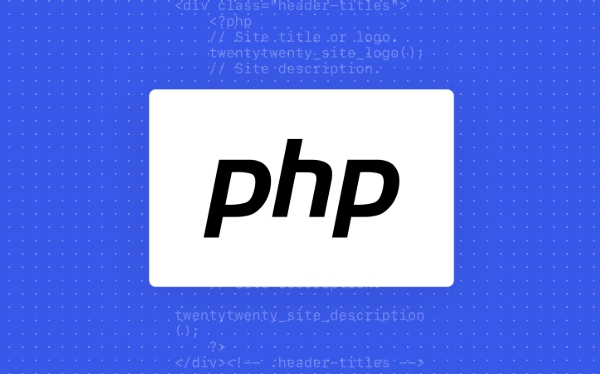 Backend Development
Backend Development
 PHP Tutorial
PHP Tutorial
 The Hidden Dangers of Variable Scope in `include` and `require` Files
The Hidden Dangers of Variable Scope in `include` and `require` Files
The Hidden Dangers of Variable Scope in `include` and `require` Files
Jul 28, 2025 am 04:40 AMThe main issue with PHP's include and require is unintended variable scope sharing, leading to bugs; 1. Included files can access and modify variables in the parent scope, causing unintended exposure of data like $admin or $password; 2. Variables in included files can silently overwrite existing ones, especially dangerous with common names like $data or $config; 3. When included inside a function, files run in local scope, so variables defined within them won’t be available outside unless global or returned, risking confusion; 4. Best practices include passing data explicitly via extract() (with caution), using functions or classes for encapsulation, prefixing variables to avoid collisions, checking isset() before use, and adopting templating engines like Twig or Blade for better scope control—always treat included files like functions with clear inputs and outputs to prevent hidden dependencies and side effects.

When using include or require in PHP, many developers overlook the subtle but serious implications of variable scope. While these constructs are commonly used to reuse code—like headers, footers, or configuration files—they can introduce hidden bugs if you don’t fully understand how variables behave across file boundaries.

The core issue? Included files inherit the scope of the calling context. That means variables defined in the parent file are accessible inside the included file, and vice versa—unless you're inside a function or closure. This can lead to unexpected behavior, especially in larger applications.
Here’s what you need to watch out for:

1. Unintended Variable Exposure
When you include a file, it runs in the same local scope as the calling code. So if you have variables defined in your main script, they’re automatically available in the included file—even if you didn’t intend to expose them.
// main.php $user = "Alice"; $admin = true; include 'template.php'; // template.php can now access $user and $admin
<!-- template.php -->
<p>Welcome, <?php echo $user; ?></p>
<?php if ($admin): ?>
<p>Admin panel access granted.</p>
<?php endif; ?>This might seem convenient, but it tightly couples your template to the outer scope. If another script includes template.php without defining $admin, you’ll get a notice or unexpected behavior.

? Danger: Accidental use of undefined variables or leaking sensitive data (like
$password,$token) into templates.
2. Variable Overwriting (Silent Collisions)
Variables defined in the included file can overwrite existing ones in the parent scope.
// main.php $message = "Original message"; include 'helper.php'; echo $message; // What will this output?
// helper.php $message = "Overwritten by helper!";
The output will be "Overwritten by helper!"—possibly breaking logic downstream. This becomes a real problem when including third-party or legacy files where variable names aren’t predictable.
? This is especially dangerous with generic names like
$data,$result,$output, or$config.
3. Using include Inside Functions: Scope Isolation (But Still Tricky)
When you include a file inside a function, it runs in the function’s local scope. Variables inside the included file are not automatically global unless explicitly declared.
function loadTemplate() {
$name = "Bob";
include 'greeting.php'; // Can use $name
}
// greeting.php
echo "Hello, $name"; // Works: outputs "Hello, Bob"But if greeting.php defines a new variable:
// greeting.php $greeting = "Hi there!";
Then $greeting exists only within loadTemplate() unless returned or declared global.
?? If you later access
$greetingoutside the function, it won’t be available—leading to confusion if you expect side effects.
4. Best Practices to Avoid Scope Surprises
To keep your code safe and predictable:
Avoid relying on implicit variable injection. Instead, pass data explicitly:
extract(['user' => $user, 'admin' => $admin]); include 'template.php';
Though even
extract()can be risky with unfiltered arrays.Use functions or classes to encapsulate logic and isolate scope.
Prefix or namespace variables in included files to reduce collision risk:
$template_user = $user; // instead of just $user
Define variables before including, or use
isset()checks in included files:<?php if (isset($admin) && $admin): ?> <p>Admin area</p> <?php endif; ?>Consider modern alternatives like templating engines (Twig, Blade) that enforce scope isolation and prevent accidental access.
Final Thoughts
include and require are powerful, but their scope behavior can introduce bugs that are hard to trace—especially in shared or long-lived codebases. The convenience of shared scope often leads to spaghetti dependencies.
The key is to treat included files like functions: know what goes in, what comes out, and avoid side effects. Be explicit, validate assumptions, and guard against variable collisions.
Basically, just because PHP lets included files access outer variables doesn’t mean they should.
The above is the detailed content of The Hidden Dangers of Variable Scope in `include` and `require` Files. For more information, please follow other related articles on the PHP Chinese website!

Hot AI Tools

Undress AI Tool
Undress images for free

Undresser.AI Undress
AI-powered app for creating realistic nude photos

AI Clothes Remover
Online AI tool for removing clothes from photos.

Clothoff.io
AI clothes remover

Video Face Swap
Swap faces in any video effortlessly with our completely free AI face swap tool!

Hot Article

Hot Tools

Notepad++7.3.1
Easy-to-use and free code editor

SublimeText3 Chinese version
Chinese version, very easy to use

Zend Studio 13.0.1
Powerful PHP integrated development environment

Dreamweaver CS6
Visual web development tools

SublimeText3 Mac version
God-level code editing software (SublimeText3)
 The Omnipresent Scope: A Practical Guide to PHP's Superglobals
Jul 26, 2025 am 09:47 AM
The Omnipresent Scope: A Practical Guide to PHP's Superglobals
Jul 26, 2025 am 09:47 AM
PHP's hyperglobal variables are always available built-in arrays used to process request data, manage state and obtain server information; 1. When using $_GET, URL parameters need to be type-converted and verified; 2. When receiving form data through $_POST, filtering should be performed with filter_input(); 3. Avoid using $_REQUEST to prevent security vulnerabilities; 4. $_SESSION needs to call session_start() and log in to reset the session ID; 5. When setting $_COOKIE, enable secure, httponly and samesite attributes; 6. The information in $_SERVER cannot be fully trusted and cannot be used for security verification; 7.$_ENV may be
 Navigating the Boundaries: A Deep Dive into Local and Global Scope
Jul 26, 2025 am 09:38 AM
Navigating the Boundaries: A Deep Dive into Local and Global Scope
Jul 26, 2025 am 09:38 AM
Thedifferencebetweenlocalandglobalscopeliesinwherevariablesaredeclaredandaccessible:globalvariablesaredefinedoutsidefunctionsandaccessibleeverywhere,whilelocalvariablesaredeclaredinsidefunctionsandonlyaccessiblewithinthem.1.Globalscopeallowsbroadacce
 Mastering Lexical Scoping: The `use` Keyword and PHP Anonymous Functions
Jul 25, 2025 am 11:05 AM
Mastering Lexical Scoping: The `use` Keyword and PHP Anonymous Functions
Jul 25, 2025 am 11:05 AM
In PHP, if you want to use external variables in anonymous functions, you must explicitly import them through the use keyword; 1. Use is used to introduce external variables into the lexical scope of the closure; 2. Pass variables by default by value, and pass them by reference with &$var syntax; 3. Multiple variables can be imported, separated by commas; 4. The value of the variable is captured when the closure is defined, not when it is executed; 5. Each iteration in the loop creates an independent closure copy to ensure that the variable value is correctly captured; therefore, use is a key mechanism to achieve the interaction between the closure and the external environment, making the code more flexible and controllable.
 The Scope Resolution Order: How PHP Finds Your Variables
Jul 25, 2025 pm 12:14 PM
The Scope Resolution Order: How PHP Finds Your Variables
Jul 25, 2025 pm 12:14 PM
PHPresolvesvariablesinaspecificorder:1.Localscopewithinthecurrentfunction,2.Functionparameters,3.Variablesimportedviauseinclosures,4.Globalscopeonlyifexplicitlydeclaredwithglobaloraccessedthrough$GLOBALS,5.Superglobalslike$_SESSIONand$_POSTwhichareal
 Demystifying Global Access: `global` Keyword vs. the `$GLOBALS` Array
Jul 25, 2025 am 05:27 AM
Demystifying Global Access: `global` Keyword vs. the `$GLOBALS` Array
Jul 25, 2025 am 05:27 AM
ThetwomaintoolsforaccessingglobalvariablesinPHParetheglobalkeywordandthe$GLOBALSsuperglobalarray;1)Theglobalkeywordcreatesareferencetoaglobalvariableinsideafunction,allowingdirectaccessandmodification,andifthevariableisundefined,itinitializesitasnull
 Scope Implications of Generators and the `yield` Keyword
Jul 25, 2025 am 04:45 AM
Scope Implications of Generators and the `yield` Keyword
Jul 25, 2025 am 04:45 AM
Functions using yield will become generators, and when called, they return the generator object instead of being executed immediately; 2. Local variables of the generator will not be destroyed during the yield pause, but will continue to exist with the generator frame until the generator is exhausted or closed; 3. Extended variable life cycle may lead to an increase in memory usage, especially when referring to large objects; 4. When combined with closures, LEGB rules are still followed, but the latebinding problem of looping variables needs to be solved by immediately binding (such as the default parameter value); 5. .close() should be called explicitly to ensure that finally block execution is performed to avoid delays in resource cleaning. The generator affects memory and behavior by extending the survival time of variables, but does not change the lexical scope rules.
 Why Your Variables Disappear: A Practical Guide to Scope Puzzles
Jul 24, 2025 pm 07:37 PM
Why Your Variables Disappear: A Practical Guide to Scope Puzzles
Jul 24, 2025 pm 07:37 PM
Variablesdisappearduetoscoperules—wherethey’redeclareddetermineswheretheycanbeaccessed;2.Accidentalglobalcreationoccurswhenomittingvar/let/const,whilestrictmodepreventsthisbythrowingerrors;3.Blockscopeconfusionarisesbecausevarisfunction-scoped,unlike
 The `global` Keyword: A Double-Edged Sword in PHP Scope Management
Jul 25, 2025 pm 05:37 PM
The `global` Keyword: A Double-Edged Sword in PHP Scope Management
Jul 25, 2025 pm 05:37 PM
TheglobalkeywordinPHPallowsfunctionstoaccessvariablesfromtheglobalscope,butitshouldbeusedsparinglyduetosignificantdrawbacks.1)Itenablesquickaccesstoconfigurationvaluesinsmallorlegacyscripts.2)ItfitsproceduralcodebaseslikeolderWordPresspluginswheredep





